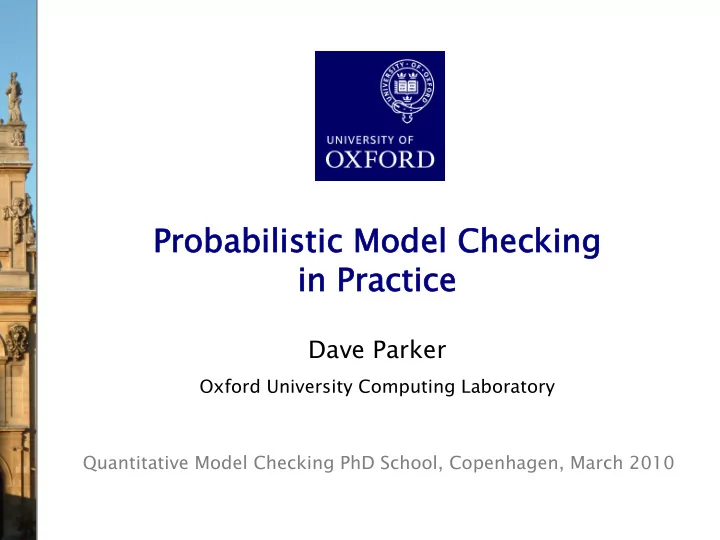

Probabilisti tic Model Checking in Practi tice Dave Parker Oxford University Computing Laboratory Quantitative Model Checking PhD School, Copenhagen, March 2010
Overview • Tool support for probabilistic model checking • The PRISM model checker − functionality, features − modelling language − property specification • PRISM tool demo • PRISM lab session
Probabilistic model checking • Recap… • Probabilistic models − discrete-time Markov chains (DTMCs) − Markov decision processes (MDPs) − continuous-time Markov chains (CTMCs) • Probabilistic temporal logics − PCTL, LTL, PCTL* (discrete-time models) − CSL (continuous-time models)
Probabilistic model checkers • PRISM (this session) − DTMCs, MDPs, CTMCs + costs/rewards • Markov chain model checkers − MRMC: explicit-state engine for DTMCs, CTMCs + rewards − PEPA Plug-in Project: CSL model checking for PEPA (CTMCs) − CASPA: symbolic model checking of stochastic process algebra • MDP model checkers − LiQuor: LTL verification for MDPs (Probmela language) − RAPTURE: abstraction/refinement tool for MDPs • Many other interesting tools being developed: − e.g. for PTAs: UPPAAL PRO, PRISM (soon), mcpta, Fortuna
The PRISM tool • PRISM: Probabilistic symbolic model checker − developed at Universities of Birmingham/Oxford, since 1999 − free, open source (GPL), versions for all major OSs • Modelling of: − DTMCs, CTMCs, MDPs + costs/rewards − simple, state-based modelling language • Model checking of: − PCTL, CSL, LTL, PCTL* + extensions + costs/rewards • Features − efficient symbolic/explicit implementation techniques − approximate verification using simulation + sampling − GUI: model editor, simulator/debugger, result visualisation
PRISM modelling language • Simple, textual, state-based language − modelling of DTMCs, CTMCs and MDPs − based on Reactive Modules [Alur/Henzinger] • Basic components: − modules: components of system being modelled • combined through parallel composition − variables: local/global, finite-ranging (integers/Booleans) − guarded commands: probabilistic updates to variables • optional action labels for synchronisation [send] (s=2) -> p loss : (s'=3)&(lost'=lost+1) + (1-p loss ) : (s'=4); action guard probability update probability update
PRISM modelling language • Parallel composition − synchronous or asynchronous composition of modules − process-algebraic operators for e.g. action hiding/renaming • Module renaming − easy construction of identical/symmetric modules • Rewards (or equivalently: costs, prices, …) − real-valued quantities assigned to states and/or transitions − these can have a wide range of possible interpretations, e.g.: − elapsed time, power consumption, size of message queue, number of messages successfully delivered, net profit, …
Example: Leader election • Randomised leader election protocol − due to Itai & Rodeh (1990) • Set-up: N nodes, connected in a ring − communication is synchronous (lock-step) • Aim: elect a leader − i.e. one uniquely designated node − by passing messages around the ring • Protocol operates in rounds. In each round: − each node chooses a (uniformly) random id ∈ {0,…,k-1} − (k is a parameter of the protocol) − all nodes pass their id around the ring − the node with the maximum unique id becomes the leader − if no unique id exists, try again with a new round
PRISM code…
PRISM property specifications • Based on (probabilistic extensions of) temporal logic − incorporates PCTL, CSL, LTL, PCTL* − also includes: quantitative extensions, costs/rewards • Example properties (leader election) − P ≥ 1 [ F “elected” ] ”with probability 1, a leader is eventually elected” − P ≥ 1 [ F G “elected” ] ”with probability 1, a leader is eventually elected permanently” − P >0.8 [ F ≤ T “elected” ] ”with probability > 0.8, a leader is elected within T steps” • Usually focus on quantitative properties: − P =? [ F ≤ T “elected” ] ”what is the probability that a leader is elected within T steps?”
PRISM property specifications • Experiments: − ranges of model/property parameters − e.g. P =? [ F ≤ T “elected” ] for N=1..5, T=1..100 where N is some model parameter and T a time bound − identify patterns, trends, anomalies in quantitative results
PRISM property specifications • Rewards/costs − expected (instantaneous/cumulative) value of reward − e.g. “the expected time for a leader to be elected” − e.g. “the expected power consumption over one hour” − e.g. “the expected queue size after exactly 90 seconds” • Best/worst-case scenarios − combining “quantitative” and “exhaustive” aspects − for MDPs, quantification over all adversaries/schedulers − e.g. P min=? [ F “terminate” ] – “worst-case probability of termination over all possible schedulers” − for any model, compute values for a range of states − e.g. R =? [ F end {“init”}{max} ] - “maximum expected run-time over all possible initial configurations”
PRISM demo…
More info on PRISM • PRISM website: http://www.prismmodelchecker.org/ − tool download: binaries, source code (GPL) − on-line example repository (50+ case studies) − on-line documentation: manual, tutorial, FAQ − support: help forum − related publications, talks, tutorials, links • Practical session using PRISM − upstairs in PC labs 2A52 and 2A54 − http://www.prismmodelchecker.org/courses/qmc10/
Recommend
More recommend